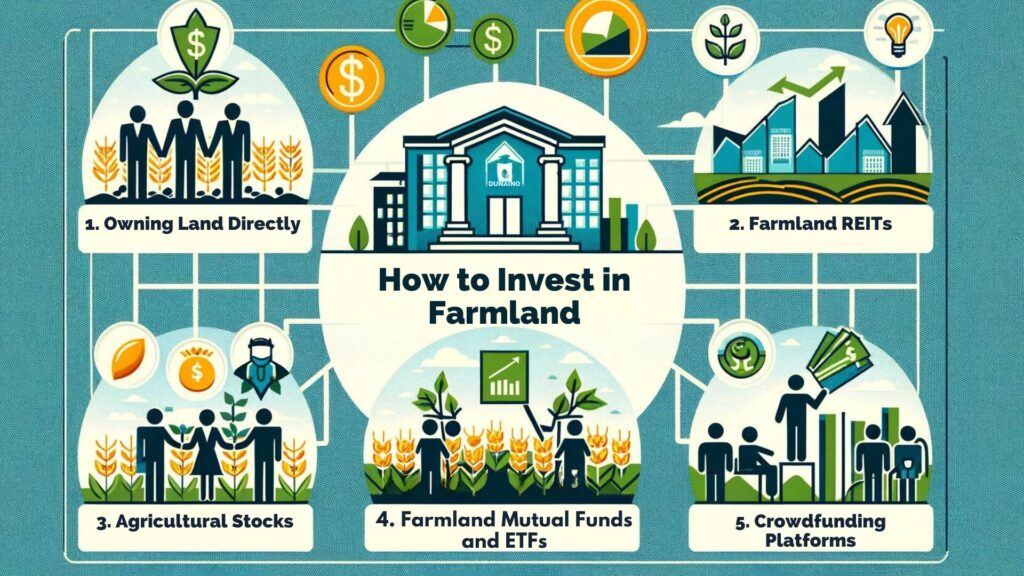Investing in farmland wasn’t accessible to most people in the past due to the high upfront costs and the need for specialized knowledge. However, new investment opportunities have made it easier and more affordable to invest in farmland.
Today, you can invest in farmland with just some extra cash and an investment account. While traditional farmland investment methods still exist, there are now new options available to a wider range of investors.
Why Invest in Farmland?
Farmland has been a lucrative investment option for centuries, with landowners reaping the benefits of steady income and asset appreciation. As the world’s population continues to grow, the demand for food and agricultural products is expected to rise, potentially driving up the value of farmland. Additionally, farmland is a tangible asset with a limited supply, which can contribute to its long-term value. Investing in farmland can also provide a hedge against inflation, as commodity prices tend to rise along with inflationary pressures.
The Benefits of Farmland Investing
Historically, farmland investment was primarily for those who could directly work the land, such as farmers or their families. This was because the only way to earn a return was through farming activities or land value appreciation.
However, farmland is now considered an alternative investment that can provide returns through rental income and land value appreciation, similar to dividend-paying stocks. This combination has led to strong historical returns for farmland investments.
Potential for Recession-Proof Returns
Additionally, some investors believe that farmland investments are recession-proof due to the constant demand for food, making them an attractive portfolio diversification option. While stocks may be volatile, the fact that people still need to eat in good times and bad can help lead to a more resilient investment.
How to Invest in Farmland: 5 Ways to Get Started
Investors now have several options to gain exposure to farmland, ranging from direct land ownership to indirect investment vehicles. These options cater to different investment goals, risk appetites, and capital requirements, making farmland an accessible alternative asset class. From traditional approaches like outright land purchases to modern platforms like crowdfunding, investors can choose the method that best suits their needs.

1. Owning Land Directly
Opportunity: Purchasing farmland directly and leasing it to farmers for crop production or livestock management offers a tangible investment opportunity. This approach allows investors to capitalize on the agricultural sector’s growth, benefiting from both the rental income and potential appreciation in land value over time.
Details: The commitment to buying farmland can be significant, with the average farm size in the U.S. reaching 464 acres in 2023. The cost of farm real estate, encompassing all land and buildings, averaged $4,080 per acre in 2023, making the average investment for a farm considerable. Despite the high entry cost, the sector’s reliance on technological advancements and increasing farm productivity presents a strong case for potential returns on investment. As such, with careful planning and management, investing in farmland can be a lucrative venture for those looking to diversify their investment portfolio into real estate and agriculture.
2. Farmland REITs
Opportunity: Farmland Real Estate Investment Trusts (REITs) provide a way to invest in agriculture without the complexities of direct land ownership. These REITs allow investors to gain exposure to the income and potential appreciation associated with farmland, while also enjoying liquidity and the benefits of professional management.
Details: Farmland REITs, like Gladstone Land Corporation (LAND) and Farmland Partners (FPI), offer unique advantages to investors by combining the stability of real estate with the growth potential of agriculture. Gladstone Land focuses on properties suitable for high-value, fresh produce and permanent crops such as nuts and fruits, emphasizing the lower risk and higher rental rates of these farms. Farmland Partners, on the other hand, has a diversified portfolio that includes both commodity crops like corn, soybeans, wheat, and specialty crops, offering services beyond leasing to enhance farm profitability.
Investing in farmland REITs can offer portfolio diversification, act as a hedge against inflation, and generate income through dividends. However, potential investors should be aware of risks such as interest rate sensitivity, natural disasters, and volatile crop prices that can impact farm revenues and, consequently, dividend payments.
Click here to learn more and subscribe to the newsletter
3. Agricultural Stocks
Opportunity: Investing in stocks of companies within the agriculture industry presents an alternative to direct farmland investment. This method allows investors to gain exposure to various aspects of the agricultural sector, including crop production, agricultural equipment, and fertilizer production, through publicly traded companies.
Details: Agricultural stocks offer diversification across different facets of the industry. Companies like Archer-Daniels-Midland (ADM), Corteva (CTVA), and Scotts Miracle-Gro (SMG) represent a broad spectrum of activities within the sector, from supply chain and crop production to agricultural chemicals and equipment. Investing in these companies can provide investors with the growth potential of the agricultural market, coupled with the liquidity and accessibility of the stock market. Such investments allow for exposure to global agricultural trends, innovations in farming technology, and the increasing demand for food and agricultural products worldwide.
While agricultural stocks offer the potential for significant returns, they also carry risks associated with market volatility, regulatory changes, and environmental factors that can impact agricultural productivity and profits. Therefore, investors should conduct thorough research and consider the broader economic and sector-specific drivers affecting these companies’ performance.
4. Farmland Mutual Funds and ETFs
Opportunity: Mutual funds and ETFs focused on the agriculture sector offer an avenue for investors to gain diversified exposure to agricultural productivity without the need to select individual stocks. These funds encompass a range of companies within the agriculture industry, including equipment manufacturers, fertilizer producers, and biotechnology firms involved in enhancing crop yields.
Details: The Fidelity Agricultural Productivity Fund (FARMX) is an example of such an investment vehicle, aiming to allocate at least 80% of its assets towards companies contributing to agricultural productivity. With a net expense ratio of 0.95% and a diverse portfolio that includes top holdings in major companies like Deere & Co, Corteva Inc, and Archer-Daniels-Midland Co, FARMX seeks long-term capital growth by investing in the evolving sector of agricultural technology and services. The fund’s performance and asset allocation reflect its commitment to capturing the growth potential within the global agriculture sector
Get your free “2024 Real Estate Market Outlook” now!
5. Crowdfunding Platforms
Opportunity: Crowdfunding platforms offer a unique opportunity for investors to participate in farmland investment without needing to manage the properties directly or invest large sums in purchasing an entire farm. This approach democratizes access to farmland investment, allowing for smaller, more accessible investment amounts.
Details: Platforms like AcreTrader, FarmTogether, and FarmFundr have emerged as leaders in the space, each providing a different focus and investment structure. AcreTrader focuses on offering investments in U.S. farmland, timberland, and vineyards, with a minimum investment typically starting from $8,000 and a management fee of 0.75%. It emphasizes passive income from farmland investments and prides itself on a rigorous vetting process for selecting farms.
FarmTogether offers a platform for accredited investors with minimum investments ranging from $15,000, focusing on both crowdfunded farmland and a Sustainable Farmland Fund. The platform is geared towards long-term, high-income investors, providing various investment options, including sole ownership for ultra-wealthy investors.
FarmFundr differentiates itself by allowing investors to directly participate in the profits of the farm’s crops in addition to land appreciation. Most deals on FarmFundr start with a $10,000 minimum investment, focusing on accredited investors with an eye on expanding to non-accredited investors in the future. Founded by a fourth-generation farmer, FarmFundr’s model offers a blend of crop profit sharing and capital appreciation.
Each of these platforms provides a unique entry point into farmland investment, emphasizing different aspects of the agricultural value chain, from land ownership and crop production to sustainable farming practices. However, potential investors should be aware of the illiquid nature of these investments, as funds are typically tied up for several years with no guarantee of finding a buyer for early exit.
Conclusion
While buying an entire farm was once the only option for farmland investment, investors now have various alternatives, including REITs, agricultural stocks, investment funds, and crowdfunding platforms. These new options have made farmland investment more accessible and affordable for a wider range of investors.
Farmland investing offers potential benefits such as steady returns, diversification, and the potential for recession-proof performance. However, as with any investment, it’s important to carefully consider the risks and opportunities before investing in farmland.
Interested in multifamily real estate investing? Our experienced team is here to help. From market research to identifying the best opportunities, we guide you through the process. Subscribe to our YouTube channel for informative videos and expert discussions, and follow us on Instagram for exclusive content. Explore our comprehensive Udemy course for detailed insights and strategies. Ready to elevate your investment journey? Contact us now to schedule a consultation and achieve your financial goals in real estate.
*This content is for informational purposes only and is not intended as financial or legal advice. Please consult with a professional advisor before making any investment decisions.




























